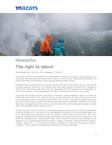
The right to return
The Covid-19 crisis and the effects of the declaration of a State of Emergency have surprised us in many ways. We have seen the Government's reaction on many fronts, making difficult decisions and trying to generate more benefits (or less damage) than the costs involved.
Notwithstanding, recognizing the successes and achievements of the Government on some fronts, in certain aspects, the actions of the Government have been clearly insufficient and in violation of human and fundamental rights that cannot be suspended within the framework of the declaration of economic emergency. I refer specifically to the right of Colombians to return to their country.
During the last 45 days we have read news of Colombian citizens trapped in places as remote as Kathmandu, New Delhi, Oman, Thailand, Russia, among many other countries. These citizens have exhausted all their efforts and savings and are now, many of them, subjected to begging because of the government's refusal to open its borders to allow the entry of Colombian nationals. Only certain flights have managed to land in Colombia, such as the flight from the United Arab Emirates, the flight from Fort Lauderdale and the flight from Peru.
The right to return to their country is a human right expressly recognized by the Universal Declaration of Human Rights (Art. 13 numeral 2), the International Covenant on Civil and Political Rights (Art. 12.4) and the American Convention on Human Rights or "Pact of San José" (Art. 22.5), all of them expressly ratified by the Colombian Congress and approved by law. Our Political Constitution, in its article 93, establishes that "international treaties and conventions ratified by the Congress, which recognize human rights and prohibit their limitation in states of exception, prevail in the internal order". Likewise, article 214 n. 2 of our Political Charter indicates that, within the framework of states of exception, "human rights and fundamental freedoms may not be suspended".
A tutelage decision has already been known where the Administrative Court of Cundinamarca protected the fundamental rights of a Colombian citizen to freedom of movement to freely enter and return to his country, as well as the right to health and family unity. It is striking that both the Government entities (Ministry of Foreign Affairs, Colombian Migration and Civil Aeronautics) and the State entities (Congress of the Republic) have opposed the plaintiff's petition and have requested the Judge to dismiss his claims. It is also striking that, being this situation common and general to all Colombians who are abroad in similar situations, the Government adopts the position of only effectively protecting the rights of the person who has been victorious in the tutela lawsuit.
Just as the Government at the beginning of the pandemic assigned a military plane to pick up the 14 Colombians who remained in Wuhan (China), it should do the same to pick up the other Colombians who are today in different countries of the world and who are trying to survive and have the right to return.
All fleets of Colombian airline planes are on the ground today and can perfectly be used (subject to an agreement with the airlines) to pick up the Colombians in this operation. The cost of this operation cannot be an excuse for not doing so. Every day that passes, by incurring in a clear violation of the human rights treaties ratified by Colombia and in direct violation of the provisions of the Constitution, the State is compromising its responsibility for the damages that these people and their families may suffer.
As Carlos Cortés, director of FLIP, said some time ago, "if a person does not have the right to return to his or her country, what rights does he or she have?


